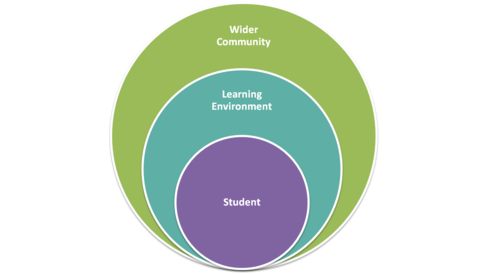Social Constructivism Assessment/Context
Contents
How Might Social Constructivist Learning Be Evaluated?
For every learner, we can imagine that there are several elements in the totality of their learning environment. Here is one way of envisioning these:- the learner
- the (immediate) learning environment
- the context of the learning environment (the wider community)
Each of these is potentially a distinct site for evaluating the effectiveness of the social constructivist learning environment. These sites correspond to three potential approaches for assessing SC learning, respectively:
- learner experience
- assessment methods aligned with a social constructivist pedagogical framework
- other evaluative methods which may or may not be aligned with a social constructivist pedagogical framework.
Learner Experience: Does it belong in the centre?
By 'learner experience' we mean the learner's experiential account of their involvement in a learning environment. Although social constructivist assessment tools require active input from the learner, learner voice has not historically been a major participant in the evaluation of learning environments (Bourke 2008).
In constructivist pedagogy, learning is the construction of knowledge, which to some extent takes place within the learner. It follows logically that the learner's experience must be of interest, as they are uniquely placed to report on their internal experiences. In social constructivism, the construction of knowledge is characterised as essentially social, hence the emphasis on fostering and evaluating group interactions, as described elsewhere in this wiki. However, we would still expect the learner's personal experience to be of interest.
As more research into human cognition and psychology shows the importance of instrinsic motivation in sustained and deep learning (as outlined here), measures of motivation may become more relevant to the evaluation of learner achievement and learning environments.
Why is learner experience at the periphery of large-scale formal evaluation?
Although we believe learner experience is a valuable measure of some aspects of a learning environment, there are other issues of immediate and sometimes overwhelming practical concern to educators, namely:
- design of aligned assessments within the learning environment
- external performance evaluation of the learning environment, e.g. standardised testing.
The Learning Environment in Context
This wiki has mostly explored social constructivist methods of assessment, that is to say, how to evaluate learner achievement in a social constructivist pedagogical framework (see section below.) However, SC learning environments, for example classrooms or schools or both, are situated in the wider community, and it is the wider community (including parents, government policy-makers, and regional or civic administrators) which determines how those learning environments will be evaluated. A social constructivist learning environment is therefore frequently bounded by (for instance) a cognitivist, behaviourist, neo-liberal or pragmatist conceptual framework.
In this situation, educators, policy makers or administrators may need or want to evaluate a specific social constructivist learning environment, or social constructivist pedagogy as instanced in one or more specific learning environments. They may seek to evaluate the learning environment using traditional assessment measures. For example, in the American school system, the 'no child left behind' policy has been associated with heavy use of standardised, often digitised, learner progress testing, and this mandated government evaluation of learner achievement will take place regardless of the nature of the learning environment.
Results are inconclusive on whether social constructivist learning environments foster better performance in traditional terms (as in Piccoli, Ahmad, & Ives, 2001). This is, in some respects, unsurprising, as social constructivist pedagogy is concerned with developing different kinds of competency from those assessed by many traditional methods. (In terms of Bloom, for example, synthesising rather than describing.)
